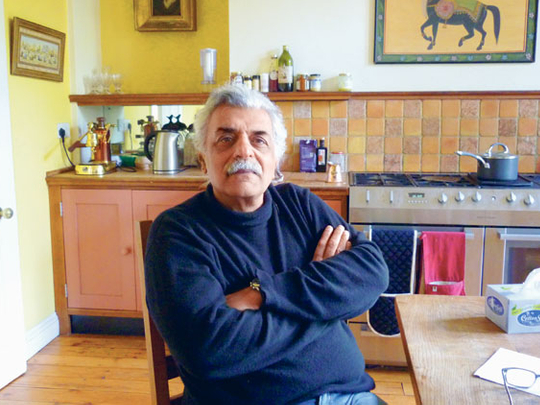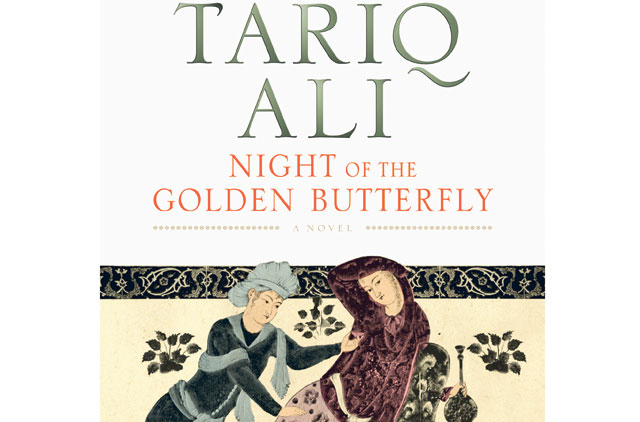
For nearly half a century Tariq Ali has stood a towering figure on the Left who has rallied against the corruption that power breeds. "I am used to being attacked in the Western media," the writer tells Weekend Review. "It used to happen non-stop and still does occasionally. But I am never really bothered. My advice to others, especially young writers starting to write, is: Never write to please. If you write to please those in power or those who determine literary prizes, it's not good for creativity or literature. Write what you really feel like, whatever it is, but never write to a pattern. And I have never done that. I write what I want to write. I don't care if people like it. If they don't like it, it doesn't bother me."
There is an unmistakable aura of defiance surrounding the 66-year-old man sitting next to me at a table covered in a clutter of newspapers and letters, at his home in Highgate, London.
Born in Pakistan in 1943, Ali was still a youngster when he began to show signs of his rebellious nature. One incident in particular should have raised alarm bells about things to come. It happened in 1957, when a black man by the name of Jimmy Wilson was sentenced to death in the US for stealing what amounted to about a dollar. When on the other end of the globe in Pakistan a young Ali came across news of what had happened, he managed to work himself into such a rage he got about 20-30 of his school friends to agree to take a protest letter to the US Consulate in Lahore.
But when the time to demonstrate came only a handful of students actually turned up. Undeterred the marchers went ahead, carrying banners of "Death for a dollar" and "Long live Jimmy Wilson". Along the way their numbers were bolstered by street urchins who decided to join the procession chanting "Jimmy Wilson Zindabad" while having little knowledge about what it was all about.
"We arrived at the US Consulate and the guy agreed to see us," Ali recalls. "Mr Spangler, I remember his name. He was such an uptight guy. Instead of trying to win us over, he was really rude. He said why have you come? Does your principal know you are here? I am going to take all your names and report you. And we gave him our names. We said we were not ashamed of being there. You are the one who should be ashamed because your country is sending Jimmy Wilson to death. He was amazed at our audacity to do this in a country where the US was so strong. So it is something I am very proud of."
In 1963 Ali left Pakistan to study at Oxford University after his vociferous opposition to military dictatorship began raising eyebrows in all the wrong places. But the rebel in Ali refused to quit and followed him to the United Kingdom, where he began to create a huge stir as a student protester and antiwar activist opposing the Vietnam War.
The decades that followed saw Ali succeed in getting several polemic books published, debate the likes of Henry Kissinger and Christopher Hitchens (while encountering Malcolm X and Marlon Brando along the way) and — perhaps most significantly — serve as the inspiration to the Rolling Stones' song Street Fighting Man.
I am here to interview Ali about his new novel, Night of the Golden Butterfly, the final instalment from his Islam Quintet series of stand-alone novels. "My daughter suggested it a long time ago," he says, explaining the title. "She said my titles are usually boring. So I said suggest one and she suggested this. And I forgot about it. Then I remembered. Many years later I was thinking how I am going to insert the golden butterfly into the story. Then I remembered the Chinese friends I had in Lahore who were in school and who used to talk Punjabi. I had never really asked them when they originally came here. Because in those days you never bothered as identity was never a big deal, you know."
The story involves Plato, a painter dying of cancer, and is narrated by his friend Dara, with the action moving between Lahore, London, Paris and Beijing. "While writing the novel I decided to tell the story of an uprising that took place in China in the middle of the 19th century and the golden butterfly then became the name of a young woman who lived in Lahore and was a Chinese Muslim and that is how it happened," he says.
The Islam Quintet came about after Ali became enraged over a comment a BBC reporter made: that Arabs were a people without a political culture. So he wrote the Shadows of the Pomegranate Tree, published in 1992, which is a masterfully woven tale revolving around the lives of Muslims living in Spain after the fall of Granada in the late 14th century.
It was a time when two million manuscripts were burnt, Muslims were forcibly being converted and Jews were being expelled from Christian lands to seek refuge in the Maghreb and the Ottoman Empire. Over the ashes of this epic crime, a new European mono-culture was constructed.
When the late Palestinian scholar Edward Said read the novel, he was so moved he told Ali he must now tell the whole story. So followed the next three books, which covered certain momentous periods in the history of the Islamic civilisation — Saladin's re-conquest of Jerusalem, the declining days of the Ottoman Empire and Muslims in Sicily following the Norman Conquest.
The Night of the Golden Butterfly is the only novel in the series set in modern times. By way of storytelling, Ali subtly manages to convey to readers his enlightening commentary on pressing cultural and social issues of our times.
For instance, there is the theme of identity. His book is littered with references to Punjabi culture, dress, cuisine and language. You even have Chinese characters who speak fluent Punjabi. But the many Punjabis I have met from Pakistan, I point out to Ali, often do not appear very forthcoming about their identity, as compared to say a Sindhi or a Pushtun. Is the book a celebration of being Punjabi?
"Well, partially it is," he replies. "And I have always very strongly felt that my mother tongue was Punjabi. That is the language I grew up with. I can speak four dialects of Punjabi. So I have always loved the language and the language of its poets and its mystics — you know, Buleh Shah, Waris Shah, Shah Hussain. These were great poets and one used to hear them being sung and talked about. Because it is not just that people are shy of speaking it," he explains. "It's the fact that the government was so keen to impose this new language called Urdu on the whole country that they forbade the use of Punjabi in the Punjab. The other languages too were played down. They wanted everyone to know Urdu.
"The Balochs, Puhtuns and Sindhis ignored it and carried on but the Punjabis, because they were now the new rulers of the country, felt it was now their duty [to use Urdu]. Also, some of the more educated Punjabis had an inferiority complex about their own language. So they preferred to speak Urdu to show, ‘Look, we are cultured too'. It's not a question of culture. It's a question of being ignorant of your own traditions. This was largely in the cities. In the countryside, Punjabi was always spoken."
But the architects of Pakistan could have argued that if you have all these languages being promoted, you won't be able to build a national identity.
"But look at the Indians," Ali says. "They have managed to do it, they have more languages then we do." But they have got a very big country. "Yeah, but we were once a very big, larger country. Then we broke up," he retorts. "My own feeling is that Urdu should have been one of the languages. It should not have been made the state language necessarily."
Another theme touched upon in the novel is the negative image of Islam being projected these days. To some it may seem odd how Ali, who is known to be an atheist, is also such an eloquent critic of Islamophobia.
For example, in one memorable episode in the Night of the Golden Butterfly, a woman wearing the hijab makes an appearance on a French TV show and wins the day with her witty performance. "At the moment, French political culture is deeply Islamophobic," he explains, when asked about the point he makes. "And so it picks on people who they think can be used to discredit the religion. And here, in that episode in the novel, the girl wearing the hijab is both infinitely more intelligent than the interviewer and Naughty Lateef [one of the characters in the novel] and outflanks them. That is the point being made.
"And Naughty Lateef is not as bad as she seems anyway, as we discover as the novel proceeds. So she is a contradictory character. But the use they try and make of her is, of course, a critique of what the West does. They find people and they create people who can then be used against a particular culture."
This brings us to a more significant point. Is the selective coverage about Islam by Western media down to just prejudice and ignorance or a deliberate policy towards attaining certain imperialistic goals? "It's totally deliberate," he says. "It's not accidental at all. I mean how come the big television channels of the Western world — CNN and BBC World — often have the same stories and show the same images in a news bulletin? And these are different people running these outfits. How come it is the same story that is given the coverage? And the tone of the reporting is virtually the same. So this is not an accident. This is quite conscious. Which is why they are so nervous of stations such as Al Jazeera or Tele Sur in South America, which provide different images of the same event, so people have a chance to see another view about what is taking place."
One of Ali's more glamorous fans is writer and poetess Fatima Bhutto. I read out to him an excerpt from a review she has written of his new book: "It is odd to hear of Ali described, as he sometimes is, as one of Britain's national treasures. For we in Pakistan wish to unequivocally claim him as ours." So then, Ali, which is it?
"I don't comment on these things, you know," he says, before going on to do just that. "I don't regard myself as anyone's national treasure. I am a writer who tries to speak the truth as often as he can. I write fiction to try and make people think. And it is fiction written very consciously and deliberately in very simple language so that people can understand. No fancy games are played in the way I write — and that's me. You know, what people think of me is up to them."
Does he see himself as an angry person? "Well, yeah, I am angry about some things," he says, getting all worked up. "I think other people should be angry too. I mean the military and corrupt politicians running our country for so long is a cause for anger. And some people who should know better, who defend Zardari by saying at least it is democracy, [should be asked] what [kind of] democracy is it? That Benazir leaves the party to her husband? What does this have to do with democracy? It is a sort of disgusting form of feudal behaviour!"
It is in times of anger that he truly becomes the Tariq Ali everyone loves. I would certainly have been disappointed by this interview if his answers had been all nice and polite ones.
Getting up to leave, I find I have switched to chatting in Urdu with Ali. He asks a few questions about me and how I found Fatima Bhutto's new book. I toy around with the idea of saying something in Punjabi. But knowing how rusty, and even mocked, my skills are in the language, I quickly discard the thought.
Some things are better left unsaid — even in the company of a rebel.
Syed Hamad Ali is an independent writer based in the UK.











